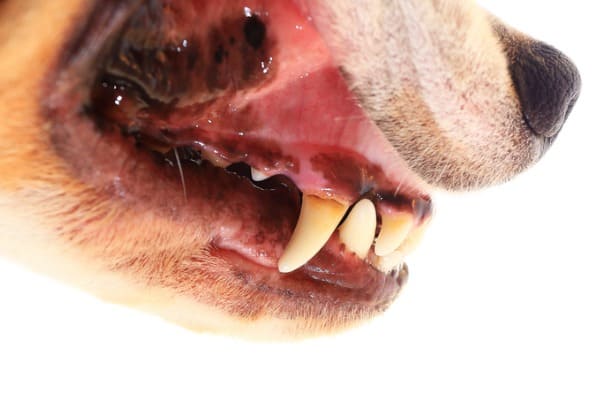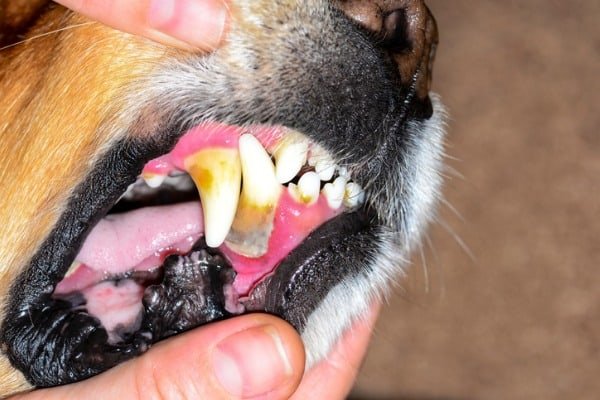When Should You Be Concerned?

If you aren’t sure about black spots or gums on your dog, a vet can tell you if it’s normal or not.
Then, you can monitor your dog’s mouth for any changes that could be an indication of something serious.
So if your dog has some new spots or blackening of gums, what could it be?
Questions? To chat with a veterinarian about your dog’s black gums, Click here
It’s a Matter of Age
Elderly dogs can develop these spots and even show up in middle age.
It’s usually just a part of an aging dog, but the texture and size can be a red flag for something else.
Gingivitis

Some dog parents slack in dental health for their pets.
If you notice a thin line of black where their teeth meet their gums, it could be a sign of gum disease.
In short, bacteria have claimed this area of your dog’s mouth and have been given the perfect environment in which to multiply.
Early signs of gingivitis besides the darkening of the gum line include foul breath and yellowing teeth.
But left untreated, the bacteria can invade further and compromise the roots of your dog’s teeth. Tooth loss can occur in severe cases.
It gets worse:
If losing teeth isn’t bad enough, the inflamed gums can become very painful for your dog.
They might refuse food, causing a whole new set of health issues.
If your dog already has signs of gingivitis, they’ll need a professional cleaning at the vet’s office to get back on track with their oral health.
From there, regular brushing at home and periodic cleanings administered by the vet can keep their mouths in good shape.
Diet can also be to blame when it comes to gingivitis. Junk food and too many human treats can contribute to this condition and many others.
Dog food with a poor nutrient balance and too many starchy fillers can also cause dental issues for your dog.
There are some indications that dogs with severe, recurring gingivitis can benefit from a raw food diet.
But you should discuss this option with your dog’s vet before making any drastic dietary changes.
What the Color of Your Dog’s Gums Mean
Oral health and dental hygiene is an extremely important part of a pets daily life. Many oral diseases can worsen over time or, in some cases, lead to other pathologies. Vigilance and proper physical examination are essential for the owner to detect a problem and begin prompt treatment. The moment we realize something is wrong, it is vital we seek veterinary medical advice as soon as possible. It must be remembered that only a veterinary specialist can diagnose the problem. You may also be referred to a veterinarian with dental expertise.
In this AnimalWised article on my dog has black gums, we look at the causes of this phenomenon as well as possible treatment options which may be available. You may also be interested in: